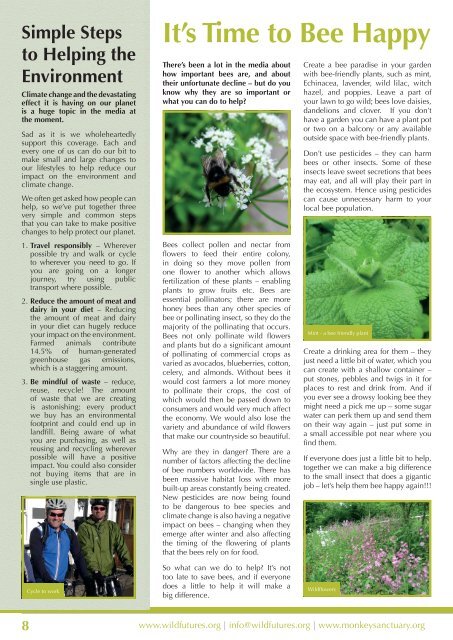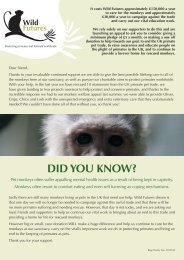Wild Futures - Newsletter Summer 2019
Monkey Sanctuary Update, Marmoset Story, Overseas Support and more…
Monkey Sanctuary Update, Marmoset Story, Overseas Support and more…
- No tags were found...
You also want an ePaper? Increase the reach of your titles
YUMPU automatically turns print PDFs into web optimized ePapers that Google loves.
Simple Steps<br />
to Helping the<br />
Environment<br />
Climate change and the devastating<br />
effect it is having on our planet<br />
is a huge topic in the media at<br />
the moment.<br />
Sad as it is we wholeheartedly<br />
support this coverage. Each and<br />
every one of us can do our bit to<br />
make small and large changes to<br />
our lifestyles to help reduce our<br />
impact on the environment and<br />
climate change.<br />
We often get asked how people can<br />
help, so we’ve put together three<br />
very simple and common steps<br />
that you can take to make positive<br />
changes to help protect our planet.<br />
1. Travel responsibly – Wherever<br />
possible try and walk or cycle<br />
to wherever you need to go. If<br />
you are going on a longer<br />
journey, try using public<br />
transport where possible.<br />
2. Reduce the amount of meat and<br />
dairy in your diet – Reducing<br />
the amount of meat and dairy<br />
in your diet can hugely reduce<br />
your impact on the environment.<br />
Farmed animals contribute<br />
14.5% of human-generated<br />
greenhouse gas emissions,<br />
which is a staggering amount.<br />
3. Be mindful of waste – reduce,<br />
reuse, recycle! The amount<br />
of waste that we are creating<br />
is astonishing; every product<br />
we buy has an environmental<br />
footprint and could end up in<br />
landfill. Being aware of what<br />
you are purchasing, as well as<br />
reusing and recycling wherever<br />
possible will have a positive<br />
impact. You could also consider<br />
not buying items that are in<br />
single use plastic.<br />
Cycle to work<br />
It’s Time to Bee Happy<br />
There’s been a lot in the media about<br />
how important bees are, and about<br />
their unfortunate decline – but do you<br />
know why they are so important or<br />
what you can do to help?<br />
Bees collect pollen and nectar from<br />
flowers to feed their entire colony,<br />
in doing so they move pollen from<br />
one flower to another which allows<br />
fertilization of these plants – enabling<br />
plants to grow fruits etc. Bees are<br />
essential pollinators; there are more<br />
honey bees than any other species of<br />
bee or pollinating insect, so they do the<br />
majority of the pollinating that occurs.<br />
Bees not only pollinate wild flowers<br />
and plants but do a significant amount<br />
of pollinating of commercial crops as<br />
varied as avocados, blueberries, cotton,<br />
celery, and almonds. Without bees it<br />
would cost farmers a lot more money<br />
to pollinate their crops, the cost of<br />
which would then be passed down to<br />
consumers and would very much affect<br />
the economy. We would also lose the<br />
variety and abundance of wild flowers<br />
that make our countryside so beautiful.<br />
Why are they in danger? There are a<br />
number of factors affecting the decline<br />
of bee numbers worldwide. There has<br />
been massive habitat loss with more<br />
built-up areas constantly being created.<br />
New pesticides are now being found<br />
to be dangerous to bee species and<br />
climate change is also having a negative<br />
impact on bees – changing when they<br />
emerge after winter and also affecting<br />
the timing of the flowering of plants<br />
that the bees rely on for food.<br />
So what can we do to help? It’s not<br />
too late to save bees, and if everyone<br />
does a little to help it will make a<br />
big difference.<br />
Create a bee paradise in your garden<br />
with bee-friendly plants, such as mint,<br />
Echinacea, lavender, wild lilac, witch<br />
hazel, and poppies. Leave a part of<br />
your lawn to go wild; bees love daisies,<br />
dandelions and clover. If you don’t<br />
have a garden you can have a plant pot<br />
or two on a balcony or any available<br />
outside space with bee-friendly plants.<br />
Don’t use pesticides – they can harm<br />
bees or other insects. Some of these<br />
insects leave sweet secretions that bees<br />
may eat, and all will play their part in<br />
the ecosystem. Hence using pesticides<br />
can cause unnecessary harm to your<br />
local bee population.<br />
Mint - a bee friendly plant<br />
Create a drinking area for them – they<br />
just need a little bit of water, which you<br />
can create with a shallow container –<br />
put stones, pebbles and twigs in it for<br />
places to rest and drink from. And if<br />
you ever see a drowsy looking bee they<br />
might need a pick me up – some sugar<br />
water can perk them up and send them<br />
on their way again – just put some in<br />
a small accessible pot near where you<br />
find them.<br />
If everyone does just a little bit to help,<br />
together we can make a big difference<br />
to the small insect that does a gigantic<br />
job – let’s help them bee happy again!!!<br />
<strong>Wild</strong>flowers<br />
European Voluntary<br />
Service<br />
The European Voluntary Service (EVS)<br />
scheme, which we’ve been a part of for a<br />
few years, allows young people to travel<br />
to other countries and volunteer for nonprofit<br />
organisations, whilst learning and<br />
developing new skills in an area they’re<br />
interested in. We offer EVS volunteer roles<br />
with us in primate care, administration,<br />
education, and maintenance.<br />
Here’s what a couple of our current<br />
EVS interns have to say about their<br />
time here:<br />
Pablo<br />
Primate Care Team<br />
Pablo<br />
Where are you from? Barcelona, Spain.<br />
What made you want to do EVS with<br />
<strong>Wild</strong> <strong>Futures</strong>? I wanted to improve<br />
my English, but also in a place where<br />
I could do some environmental work at<br />
the same time. I had some experience<br />
with primate care, so I knew what to<br />
expect about working in a sanctuary.<br />
What is your average working day like?<br />
I care for the Barbary macaques and/<br />
or the woolly monkeys, and a typical<br />
day can consist of cleaning enclosures,<br />
moving the animals through runways,<br />
feeding and making enrichment.<br />
Around those core jobs, I give talks,<br />
pick leaves for the monkeys, and do<br />
daily behavioural observations as well<br />
general maintenance work.<br />
What do you enjoy most about doing<br />
EVS? The thing that I like the most is<br />
having the opportunity to be abroad for<br />
a long time, knowing a lot of different<br />
people and learning a new culture<br />
while practising English.<br />
What do you hope to do in the future?<br />
I’d like to do a master’s in biodiversity<br />
management and continue with<br />
my career.<br />
Rike<br />
Education Team<br />
Rike<br />
Where are you from? I am from<br />
Schafflund, which is in Northern<br />
Germany not far from the Danish border.<br />
What made you want to do EVS with<br />
<strong>Wild</strong> <strong>Futures</strong>? I always wanted to spend<br />
time abroad, speak another language<br />
and get out of my comfort zone. <strong>Wild</strong><br />
<strong>Futures</strong> was one of the most fascinating<br />
projects I read about when looking for<br />
an EVS position.<br />
The combination of speaking English<br />
fluently, living in the beautiful region<br />
of Cornwall and working with animals<br />
to give them a better life – what more<br />
could you want?<br />
What is your average working day<br />
like? My morning starts with cleaning<br />
enclosures. In the afternoon I have lots<br />
of different jobs! I give talks about the<br />
monkeys and the primate pet trade. I<br />
take care of the education rooms.<br />
I do daily observations on the<br />
monkeys, learning their characters and<br />
behaviours. I work on presentations<br />
and informative materials. I also give a<br />
variety of educational workshops to the<br />
other volunteers. But there’s a lot more<br />
to do – so I never get bored!<br />
What do you enjoy most about doing<br />
EVS? Living at the Sanctuary is a unique<br />
experience. You live with many people<br />
from other countries and find a lot out<br />
about yourself.<br />
It teaches you how to make very quick<br />
friends, speak with strangers, challenge<br />
yourself and get better at what you are<br />
doing every day.<br />
What do you hope to do in the future?<br />
I will perhaps study Law in Germany.<br />
This scheme is funded by the<br />
Erasmus+ programme of the European<br />
Commission. To find out more about<br />
the voluntary schemes that we offer<br />
visit www.wildfutures.org/europeanvoluntary-service<br />
8 www.wildfutures.org | info@wildfutures.org | www.monkeysanctuary.org<br />
Conserving natural habitats through education and sustainable living<br />
9




